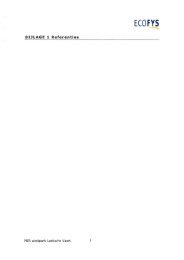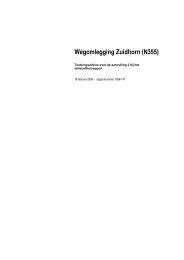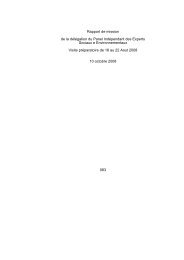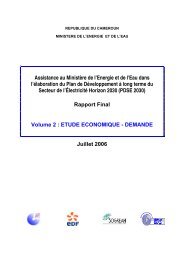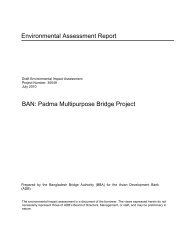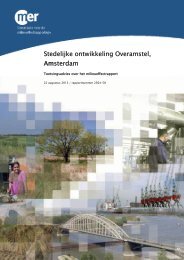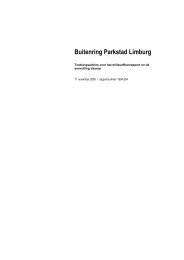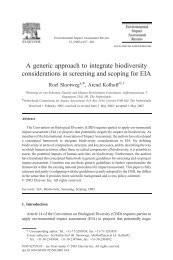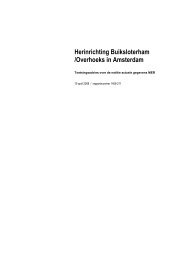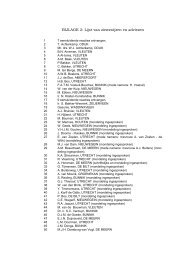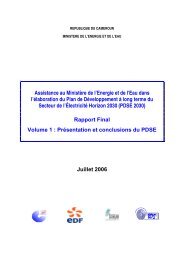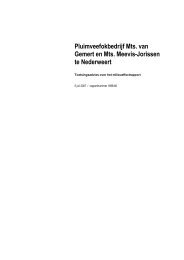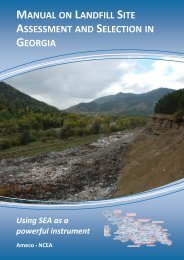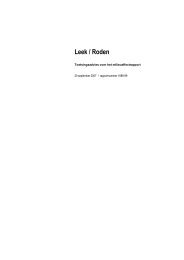Scoping Advice for the Dutch IWRM Support Programme Rwanda
Scoping Advice for the Dutch IWRM Support Programme Rwanda
Scoping Advice for the Dutch IWRM Support Programme Rwanda
Create successful ePaper yourself
Turn your PDF publications into a flip-book with our unique Google optimized e-Paper software.
2.3 The National Water Resources Master PlanThe Master Plan planning process merits special attention as <strong>the</strong> Master Plan is expected to be aninfluential document when adopted. The objectives of <strong>the</strong> Master Plan are to:- Quantify available water resources (surface & ground, in time and space, including waterbalance per (sub)catchment with monthly resolution);- Quantify water resources demand by sector and catchment;- Identify surplus and deficit areas in time and space;- Propose a management plan <strong>for</strong> optimal and rational utilization;The Master Plan process will produce two main outputs:- A Master Plan with a 30 year time horizon describing <strong>the</strong> main development options <strong>for</strong> eachlevel 1 catchment (and some level 2 sub-catchments) 14 .- A Management In<strong>for</strong>mation System (MIS), containing all collected data, including a GIS. Theconsultants presently working on <strong>the</strong> Master Plan see this instrument as an important outputas it provides a tool <strong>for</strong> <strong>the</strong> implementation of <strong>IWRM</strong> measures.According to <strong>the</strong> inception report 15 <strong>the</strong> Master Plan would also provide:- Operation and maintenance plan <strong>for</strong> <strong>the</strong> entire monitoring, analysis and management decisionsystem and infrastructure;- Plan <strong>for</strong> legal, institutional and organizational streng<strong>the</strong>ning;- Plan <strong>for</strong> knowledge transfer and capacity building;- Implementation plan <strong>for</strong> <strong>the</strong> water resources management system and infrastructure;- Detailed cost estimates.4. The NCEA concludes that if all of <strong>the</strong> above elements will be developed as <strong>for</strong>eseen, <strong>the</strong> MasterPlan will become <strong>the</strong> main document guiding <strong>IWRM</strong> implementation in <strong>the</strong> next five years and will<strong>the</strong>re<strong>for</strong>e be of key importance to <strong>the</strong> Water Department as its key reference point <strong>for</strong> <strong>IWRM</strong>practice.2.3.1 The in<strong>for</strong>mation base of <strong>the</strong> Master PlanAlthough <strong>the</strong> Master Plan process is very comprehensive and will generate a significant amount ofrelevant in<strong>for</strong>mation, it will <strong>for</strong> a large part be based on existing in<strong>for</strong>mation, which is oftenlimited, old, or collected from an unreliable source or method. As a result, <strong>the</strong> water supply anddemand data, including <strong>the</strong> water balances at (sub)catchment level, will be indicative only.For now, such indicative data will be sufficient to provide an overview of potential developmentopportunities and constraints. Eventually however, <strong>the</strong>se indicative data will not have enoughreliability <strong>for</strong> detailed planning of interventions at catchment level. Indeed, <strong>the</strong> developers of <strong>the</strong>plan warn to be careful as <strong>the</strong>y also estimate <strong>the</strong> reliability of <strong>the</strong> present in<strong>for</strong>mation base to be14Level 0 catchments are <strong>the</strong> Nile and Congo basins, subdivided in 9 sub-basins at level 1.15 Consultancy services <strong>for</strong> development of <strong>Rwanda</strong> national water resources master plan, tender number 021/rnra/2011 -2012,inception report, SHER Ingénieurs-Conseils s.a., October 20129



